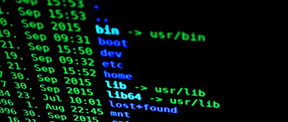**Locate: Find Files Quickly and Easily**
Locate is a powerful command-line tool for finding files on a Linux system. It uses a database to keep track of the location of files, making it much faster than the find command. This makes it ideal for quickly finding files that match a certain criteria, such as a filename or file type.
To use locate, simply type the command followed by the search term. For example, to find all files named “myfile” you would type:
“`
locate myfile
“`
Locate will then search the database and return a list of all files that match the search term. You can also use wildcards in your search term to match multiple files. For example, to find all files that start with the letter “a” you would type:
“`
locate a*
“`
Locate can also be used to search for files by type. For example, to find all JPEG image files you would type:
“`
locate *.jpg
“`
Locate is a very versatile tool that can be used to find files quickly and easily. It is a valuable addition to any Linux user’s toolkit.
**Yes: A Simple Command with Many Uses**
Yes is a simple command that outputs a single word or phrase repeatedly. It is often used in conjunction with other commands to create complex scripts and commands.
One common use for yes is to provide input to a command. For example, the following command will print the word “hello” ten times:
“`
yes hello | head -10
“`
Yes can also be used to create an infinite loop. This can be useful for testing purposes or for creating a continuous stream of data. For example, the following command will create an infinite loop that outputs the word “hello”:
“`
yes hello
“`
Yes can also be used to generate random data. The following command will generate 100 lines of random data:
“`
yes ‘ ‘ | tr -dc ‘a-z0-9’ | head -100
“`
Yes is a simple command with many uses. It is a valuable tool for any Linux user’s toolkit.
**Apropos: Find Commands by Keyword**
Apropos is a command-line tool that searches the manual pages for commands that match a given keyword. This can be a useful way to find commands that you are not familiar with or to learn more about a particular command.
To use apropos, simply type the command followed by the keyword. For example, to find all commands that are related to networking you would type:
“`
apropos network
“`
Apropos will then search the manual pages and return a list of all commands that match the keyword. You can also use wildcards in your keyword to match multiple words. For example, to find all commands that start with the letter “n” you would type:
“`
apropos n*
“`
Apropos is a valuable tool for any Linux user. It can help you to find commands that you are not familiar with or to learn more about a particular command.
**Find: A Powerful Tool for Finding Files**
Find is a powerful command-line tool for finding files on a Linux system. It can be used to search for files by name, type, size, date, and other criteria. Find can also be used to perform actions on the files that it finds, such as deleting them or moving them to a different location.
To use find, simply type the command followed by the search criteria. For example, to find all files named “myfile” you would type:
“`
find / -name myfile
“`
Find will then search the entire filesystem for files named “myfile” and return a list of all matches. You can also use wildcards in your search criteria to match multiple files. For example, to find all files that start with the letter “a” you would type:
“`
find / -name a*
“`
Find can also be used to search for files by type. For example, to find all JPEG image files you would type:
“`
find / -name “*.jpg”
“`
Find can also be used to search for files by size. For example, to find all files that are larger than 10 megabytes you would type:
“`
find / -size +10M
“`
Find can also be used to search for files by date. For example, to find all files that were modified in the last 24 hours you would type:
“`
find / -mtime -1
“`
Find is a very powerful tool that can be used to find files quickly and easily. It is a valuable addition to any Linux user’s toolkit.
